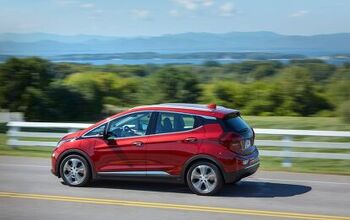Renault-Nissan Takeover Gives Mitsubishi a Chance to Dump Its Most Embarrassing Product

After inking the deal that brought Mitsubishi Motors under his corporate umbrella, Nissan-Renault chairman Carlos Ghosn said the acquisition would have a “massive” impact on the struggling automaker.
By sharing the alliance’s technology, platforms and engines, Mitsubishi can look forward to a brighter, product-filled future, he claimed. Full integration is still years away, but a new report sheds some light on the first all-new product born of the $2.29 billion deal.
According to Nikkei (via Reuters), the alliance takeover means a new green vehicle for Mitsubishi. The newspaper claims the all-electric model will borrow the platform and powertrain of the next-generation Nissan Leaf.
That’s good news for Mitsubishi, as the company’s current electric car is anything but hot. Small, odd-looking, and sporting an estimated 59 miles of range, the diminutive i-MiEV hatchback can’t compete with the robust, long-range rivals entering the EV market. The model returns for 2017, just so Mitsubishi can keep an EV in its lineup.
If you’re thinking of scoring a $23,845 i-MiEV, expect to find yourself in a club with few members. Sales of the awkward EV totaled 91 units in the U.S. during the first 11 months of 2016. Mitsubishi sold five of them in November, four in October.
When we’ll see this new model is up for debate. Last week, Renault-Nissan announced that the next-generation Leaf and Renault Zoe would share the same platform, but the company wasn’t in the mood to discuss specifics. The alliance’s senor vice president, Arnaud Deboeuf, said the shared-platform EVs would appear sometime after the Leaf’s 2018 refresh. French newspaper Les Echos said the vehicles wouldn’t appear before 2020.
That timeline doesn’t exactly jibe with earlier reports, which hinted at a new, long-range Leaf arriving in 2018. The Nikkei report mentions the same date for the launch of the new EVs. Hopefully, we’ll hear official word at next month’s Consumer Electronics Show or North American International Auto Show.
According to Nikkei, by sharing a platform, motor, inverter and battery, the new Leaf should see its price drop by one-fifth. With these components on hand, Mitsubishi could sell a new, much longer-ranged vehicle at a competitive price point, and send the unloved i-MiEv behind the barn.
Whether or not the future Mitsubishi adopts the four-door hatchback bodystyle of its corporate siblings is another mystery. Automotive News speculates that the i-MiEV’s replacement could take on a crossover bodystyle.
[Image: Mitsubishi Motors]

More by Steph Willems
Latest Car Reviews
Read moreLatest Product Reviews
Read moreRecent Comments
- Kjhkjlhkjhkljh kljhjkhjklhkjh since most EVs are north of 70k specc'ed out + charger installation this is not news. You don't buy a new car every few years.This is simply saturation and terrible horrible third world country level grid infrastructure (thanks greedy exces like at the holiday farm fire where I live)
- MaintenanceCosts I think pretty much all of the difference between this year and last year is that the right-wing noise machine, facing an audience crisis, has decided that EVs, and wildly distorted claims about EVs and EV mandates, are a good way to to get gullible people angry and start replacing lost traffic.
- MaintenanceCosts I'd like to see a comparison between this and the base Model S, which should have similar performance numbers.I spent five days and 500 miles with a base 2022 Model S in Texas last week, and enjoyed it far more than my previous Model 3 drives - I think the Model S is a very good to excellent car, although "FSD" is a huge fail and I'd still have a lot of trouble giving Elon Musk money.
- DesertNative In hindsight, it's fascinating to see how much annual re-styling American cars received in the 1950's. Of course, that's before they had to direct their resources to other things like crash-worthiness, passenger safety, pollution controls, etc. It was a heady time for car designers, but the rest of us have benefited immeasurably from the subsequent changes.
- Cprescott Aside for how long it takes to charge golf carts since I don't live in a place where I can have my own charger, is the game that golf cart makers play when your battery fails and they blame you and charge you $15-25k to replace them.


































Comments
Join the conversation
The i-MiEV should be restricted to Neighborhood Electric Vehicle status.
...And the subprime lenders rejoiced.